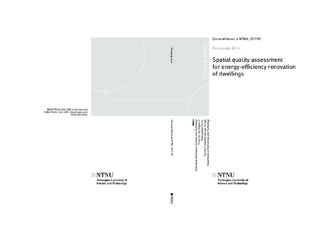| dc.contributor.advisor | Wyckmans, Annemie | |
| dc.contributor.advisor | Matusiak, Barbara | |
| dc.contributor.author | Acre, Fernanda | |
| dc.date.accessioned | 2017-05-09T09:12:20Z | |
| dc.date.available | 2017-05-09T09:12:20Z | |
| dc.date.issued | 2017 | |
| dc.identifier.issn | 1503-8181 | |
| dc.identifier.uri | http://hdl.handle.net/11250/2441986 | |
| dc.description.abstract | Spatial quality is the perception of the quality of the physical space. The user perceives spatial quality through the relationships between physical elements. The interface between walls, ceilings, doors, windows and columns, as well as inside and outside spaces under different (day) light conditions all define spatial quality. This PhD research thesis proposes a spatial quality definition, and a measurable and objective assessment framework to evaluate and predict the impact of energy efficiency renovation of dwellings on spatial quality.
The definition and assessment are based on four spatial quality determinants:
(1) views, (2) internal spatiality and spatial arrangements, (3) the transition between public and private spaces, and (4) perceived density, built and human densities. These spatial quality determinants are developed during the PhD research, based on a literature study on the quality of life in the urban environment, spatiality and spatial perception, energy efficiency renovation of dwellings, and a study of seven actual dwelling renovation cases. The prime reasons why this research has focused on spatial quality are the lack of a clear spatial quality definition on the building scale in the literature, and the sometimes unintended but always unmeasured impact of energy efficiency renovation of dwellings on spatial quality.
Climate change and the urge for sustainability have led the building industry into a radical re-thinking of how they construct new buildings and renovate existing ones. Energy efficiency renovation of dwellings is an opportunity to increase people’s well-being in a dwelling, rather than just improving its technical energy performance. The positive link between the renovation and benefits to people’s everyday life has the potential to increase end users’ acceptance and building owners’ willingness for renovation. The spatial quality definition and assessment developed in this PhD research are intended to strengthen the understanding of the quality of physical spaces in dwellings. The assessment can help to evaluate and predict the effect of energy efficiency renovation on spatial quality in dwellings. It can also help design teams to include spatial quality in energy efficiency renovation, and explore the potential of the renovation to improve the spatial quality in dwellings.
This PhD work has two contributions and two main findings. The first contribution is the spatial quality definition for dwellings. The second contribution is the assessment framework. The first main finding of the research is that energy efficiency renovation affects spatial quality in dwellings, and that the renovation can improve spatial quality, not only energy performance. The effects can be positive, for example, if there are new openings in the facade, or negative if the changes in the plan result in excessively deep rooms in relation to the size of the windows. The second main finding follows from the literature study on the renovation of dwellings, on spatial quality related issues, and from the study of the renovation cases. In order to improve spatial quality in energy efficiency renovation, increased spatial quality may be planned at an early stage of the renovation process together with the increased energy performance. | nb_NO |
| dc.language.iso | eng | nb_NO |
| dc.publisher | NTNU | nb_NO |
| dc.relation.ispartofseries | Doctoral theses at NTNU;2017:92 | |
| dc.relation.haspart | Acre, Fernanda; Wyckmans, Annemie.
The Impact of Dwelling Renovation on Spatial Quality - The Case of the Arlequin Neighbourhood in Grenoble, France. Smart and Sustainable Built Environment 2015 ;Volum 4.(3) s. 268-309 | |
| dc.relation.haspart | Acre, Fernanda; Wyckmans, Annemie.
Dwelling renovation and spatial quality: The impact of the dwelling renovation on spatial quality determinants. International Journal of Sustainable Built Environment 2015 ;Volum 4.(1) s. 12-41
https://doi.org/10.1016/j.ijsbe.2015.02.001
Attribution-NonCommercial-NoDerivatives 4.0 International (CC BY-NC-ND 4.0) | |
| dc.relation.haspart | Acre, Fernanda; Wyckmans, Annemie.
Spatial Quality Determinants for Residential Building Renovation: A Methodological Approach to the Development of Spatial Quality Assessment. International Journal of Sustainable Building Technology and Urban Development 2014 ;Volum 5.(3) s. 183-204
http://dx.doi.org/10.1080/2093761X.2014.923793 | |
| dc.relation.haspart | Acre, Fernanda; Wyckmans, Annemie.
Spatial Quality in Building Performance Assessment Tools, The case of Dwelling Renovation for Energy Efficiency. Funded by UNIFOR Norwegian Funds for Research 2014-05-15. I: World Sustainable Building 2014 Conference | |
| dc.relation.haspart | Acre, Fernanda.
Spatial Quality Assessments for Building Performance Tools in Energy Renovation. Portugal SB13 Contribution of Sustainable Building to Meet EU 20-20-20 Targets | |
| dc.relation.haspart | Acre, Fernanda.
Spatial Quality Indicators for Energy Renovation of Residential Buildings. CESB13 Central Europe Towards Sustainable Buildings 2013, Sustainable Building and Refurbishment for next Generations | |
| dc.relation.haspart | Acre, Fernanda.
Density and Spatial Quality, High density and perceived spatial quality on the transition from public to private spaces. 4th CIB Smart and Sustainable Built Environments - SASBE2012: Emerging Economies; | |
| dc.title | Spatial quality assessment for energy-efficiency renovation of dwellings | nb_NO |
| dc.type | Doctoral thesis | nb_NO |
| dc.subject.nsi | VDP::Humanities: 000::Architecture and design: 140 | nb_NO |
| dc.description.localcode | Not electronically available, in accordance with the author's wishes. | nb_NO |

